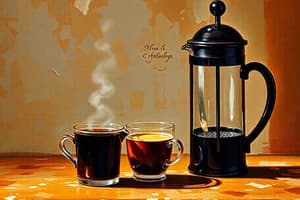Podcast
Questions and Answers
Which type of coffee bean is characterized as strong and bitter?
Which type of coffee bean is characterized as strong and bitter?
- Arabica
- Robusta (correct)
- Excelsa
- Liberica
What is the ideal water temperature range for brewing coffee?
What is the ideal water temperature range for brewing coffee?
- 190 to 205 degrees Fahrenheit
- 180 to 190 degrees Fahrenheit
- 210 to 220 degrees Fahrenheit
- 195 to 205 degrees Fahrenheit (correct)
What role do the quality and ratio of water play in coffee brewing?
What role do the quality and ratio of water play in coffee brewing?
- They must be identical to the coffee bean ratio.
- They have no effect on the brewing process.
- They determine the type of beans that can be used.
- They influence the strength and flavor of the coffee. (correct)
Which coffee bean is known for its smooth and flavorful characteristics?
Which coffee bean is known for its smooth and flavorful characteristics?
Which factor is not mentioned as influencing the taste of coffee?
Which factor is not mentioned as influencing the taste of coffee?
What is the significance of the coffee preparation methods learned in the course?
What is the significance of the coffee preparation methods learned in the course?
What is the brewing time for espresso?
What is the brewing time for espresso?
Which brewing method is known for delivering a rich, full-bodied brew?
Which brewing method is known for delivering a rich, full-bodied brew?
What is the main benefit of grinding coffee beans right before brewing?
What is the main benefit of grinding coffee beans right before brewing?
How does the amount of water added affect the strength of the coffee?
How does the amount of water added affect the strength of the coffee?
Flashcards are hidden until you start studying
Study Notes
Introduction to Brewing Coffee
- A perfect cup of coffee can enhance your daily routine, whether for starting the day or winding down.
- Learning objectives involve identifying key ingredients and mastering different brewing techniques.
Key Ingredients and Their Roles
- Coffee beans impact flavor significantly, with main types being:
- Arabica: Smooth and flavorful.
- Robusta: Strong and bitter.
- Liberica: Fruity and floral.
- Excelsa: Tart and fruity.
Importance of Water and Temperature
- Water quality, temperature, and ratio are crucial in brewing.
- Ideal water temperature is between 195°F to 205°F for optimal extraction.
Brew Time by Method
- Different brewing methods require varying brew times:
- Drip Coffee: 4-6 minutes.
- French Press: 4-5 minutes.
- Pour-Over: 2.5-4 minutes.
- Espresso: 25-30 seconds.
Making the Perfect Cup of Coffee
- Coffee Beans: Use freshly roasted beans and grind them just before brewing for maximum flavor.
- Water Proportion: Filtered water is recommended; adjust water quantity based on desired strength.
- Brewing Process: Ensure all equipment is clean. Add water, followed by coffee, and activate the brewing machine.
- Enjoyment: Customize your brew with milk, cream, sugar, or enjoy it black.
Quality Assessment
- Taste and Aroma: Check for desired flavor notes; assess acidity or bitterness.
- Appearance: Ensure the coffee is clear, free from sediment, and has good color consistency.
- Brewing Process: Confirm instructions were followed correctly, including grind size and water temperature.
Introduction to Brewing Coffee
- A perfect cup of coffee can enhance your daily routine, whether for starting the day or winding down.
- Learning objectives involve identifying key ingredients and mastering different brewing techniques.
Key Ingredients and Their Roles
- Coffee beans impact flavor significantly, with main types being:
- Arabica: Smooth and flavorful.
- Robusta: Strong and bitter.
- Liberica: Fruity and floral.
- Excelsa: Tart and fruity.
Importance of Water and Temperature
- Water quality, temperature, and ratio are crucial in brewing.
- Ideal water temperature is between 195°F to 205°F for optimal extraction.
Brew Time by Method
- Different brewing methods require varying brew times:
- Drip Coffee: 4-6 minutes.
- French Press: 4-5 minutes.
- Pour-Over: 2.5-4 minutes.
- Espresso: 25-30 seconds.
Making the Perfect Cup of Coffee
- Coffee Beans: Use freshly roasted beans and grind them just before brewing for maximum flavor.
- Water Proportion: Filtered water is recommended; adjust water quantity based on desired strength.
- Brewing Process: Ensure all equipment is clean. Add water, followed by coffee, and activate the brewing machine.
- Enjoyment: Customize your brew with milk, cream, sugar, or enjoy it black.
Quality Assessment
- Taste and Aroma: Check for desired flavor notes; assess acidity or bitterness.
- Appearance: Ensure the coffee is clear, free from sediment, and has good color consistency.
- Brewing Process: Confirm instructions were followed correctly, including grind size and water temperature.
Studying That Suits You
Use AI to generate personalized quizzes and flashcards to suit your learning preferences.




